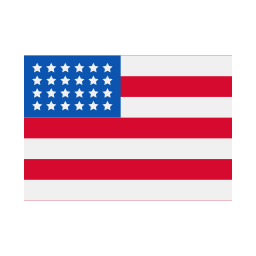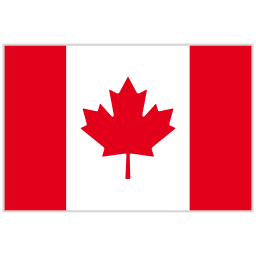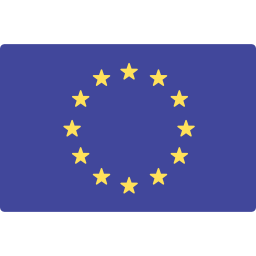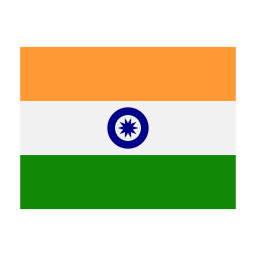MALAYSIA – GENERAL INFORMATION

GEOGRAPHY
Malaysia is situated in central South East Asia, bordering on Thailand in the north, with Singapore and Indonesia to the south and the Philippines to the east. It is composed of Peninsular Malaysia and the states of Sabah and Sarawak on the north coast of the island of Borneo, 404-600 miles across the South China Sea. Peninsular Malaysia is an area of forested mountain ranges running north-south, on either side of which are low-lying coastal plains. The coastline extends some 1,200 miles. The West Coast consists of mangrove swamps and mudflats which separate into bays and inlets. In the west, the plains have been cleared and cultivated, while the unsheltered East Coast consists of tranquil beaches backed by dense jungle. Sarawak has alluvial, and in places, swampy coastal plains with rivers penetrating the jungle-covered hills and mountains of the interior. Sabah has a narrow coastal plain that gives way to mountains and jungle. Mount Kinabalu, at 13432 ft, is the highest peak in Malaysia. The major islands are Langkawi (a group of 99 islands), Penang and Pangkor off the West Coast; and Tioman, Redang, Kapas, Perhentian and Rawa off the East Coast.
HISTORY
During the late 18th and 19th centuries, Great Britain established colonies and protectorates in the area of current Malaysia. Japan occupied these from 1942 to 1945. In 1948, the British-ruled territories on the Malay Peninsula formed the Federation of Malaya, which became independent in 1957.
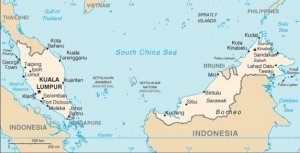
Malaysia was formed in 1963 when the former British colonies of Singapore and the East Malaysian states of Sabah and Sarawak on the northern coast of Borneo joined the Federation. The first several years of the country’s history were marred by Indonesian efforts to control Malaysia, Philippine claims to Sabah, and Singapore’s secession from the Federation in 1965.
THE PEOPLE
Malaysia’s cultural mosaic is marked by many different cultures, but several in particular have had especially lasting influence on the country. Chief among these is the ancient Malay culture, and the cultures of Malaysia’s two most prominent trading partners throughout history – the Chinese, and the Indians. These three groups are joined by a dizzying array of indigenous tribes, many of which live in the forests and coastal areas of Borneo. Although each of these cultures has vigorously main-tained its traditions and community structures, they have also blended together to create contemporary Malaysia’s uniquely diverse heri-tage.
SOCIAL CONVENTIONS
Social conventions in Malaysia are dictated by religion and culture, with different norms amongst Muslim Malays, Indian Hindus and followers of Chinese religions. The catch-all greeting in Bahasa Melayu is selamat, but Malays are more likely to use the Arabic phrase assalamualaikum, meaning ‘peace be with you’. The standard title for Malay men is Encik (pronounced Enchik), which can be used with or without the person’s name; single Malay women should be called Cik (pronounced Che) and married women Puan.
Touching the hand to the chest is a sign of respect and a relaxed wrist and gentle touch should be adopted when shaking hands. Chinese and Indians usually use Western forms of address. Hospitality is always warm, lavish and informal. When eating food by hand, only the right hand should be used. Visitors should respect religious beliefs and follow the Malaysian example, particular when it comes to appropriate attire. Footwear should be taken off at the door when entering a house or temple. Outside the workplace, dress should be informal, but not overly casual.
LANGUAGES
Bahasa Melayu is the national and official language, but English is widely spoken. Other languages such as Chinese (Cantonese and Hokkien), Iban and Tamil are spoken by minorities.
GOVERNMENT
Malaysia has Constitutional monarchy since 1963. It gained independence from the UK in 1957.
TIME ZONE
Malaysia is 12 hours ahead of Eastern Standard Time (EST).
ELECTRICITY
The voltage used in Malaysia is 230/240 volts – 50 Hz. If your electrical appliance uses 110/120 volts, you need to use a transformer/converter to step down the 230/240 volts Malaysian voltage to your 110/120 volt appliances. Failing to do so will damage your electrical appliances.
CLIMATE
The best time for beach holidays or scuba-diving will depend on which part of Malaysia you intend to visit. The country is affected by the south-west monsoon from May to September and the north-east monsoon from November to March, and different parts of the country have their dry and wet seasons at different times of year.
On the west coast, the wettest months are May to October. On the east coast, the wettest months are September to December. Kuala Lumpur is wettest from March to April and September to November, while Malaysian Borneo sees its heaviest rainfall between November and February. The best time to visit for dry weather is June and July on the east coast, January and February on the west coast, April in Sabah and June to July in Sarawak.
Clothes To Wear:
Lightweight, loose-fitting clothes are sensible at any time of year. To avoid offending local sensibilities, female travelers should wear clothes that cover the legs and upper arms. Note that shorts are rarely worn by adults, except at the beach. Full-length trousers will create a better impression. Because of the rainfall patterns and the vagaries of Malaysia weather, always carry an umbrella.
LOGISTICAL
Entry & Exit Requirements:
To enter Malaysia, your passport must be valid for at least six months. You do not need a visa to enter Malaysia if you are coming for business or tourism for stays of 90 days or less. When you arrive, immigration officials will place an entry stamp in your passport to specify the number of days you
can stay. Though immigration officials generally give 90 days, it’s not a guarantee, so you should check the stamp in your passport after you enter. Generally, these entry stamps are known as social visit passes (visas) and can be extended for two months. Travelers to Malaysia are electronically fingerprinted on arrival when arriving by air, and again on departure. While in Malaysia, you should carry your passport with you at all times. More information on the time you will be allowed to stay in Malaysia can be found on the Malaysian Ministry of Foreign Affairs’ website.
If you travel into the eastern Malaysian states of Sabah and Sarawak (on the island of Borneo) from peninsular Malaysia, or between the provinces of Sabah and Sarawak, you will be required to show your passport to immigration authorities to enter these parts of Malaysia. These states have their own immigration authorities who will determine if you can enter and for how long. You should pay attention to the amount of time you’re allowed to stay and be careful not to exceed it. Entry stamps issued by Sabah and Sarawak immigration officials are also valid for other parts of Malaysia.
If you have Israeli entry or exit stamps in your U.S. passport, you should not encounter difficulty at Malaysian Immigration. However, U.S.-Israeli dual nationals have been denied entry after presenting their Israeli passports to show exit stamps from their last destination. Therefore, it is important that U.S.-Israeli dual nationals use their U.S. passports to depart the last country on their itinerary prior to arriving in Malaysia.
For more information on the latest entry procedures and requirements, contact the Embassy of Malaysia, 3516 International Court NW, Washington, DC 20008, telephone: (202) 572-9700. You can also contact the Embassy via email. Alternatively, you may contact the Malaysian Consulate in New York, telephone: (212) 490-2722; or the consulate in Los Angeles, telephone: (213) 892-1238. Visit the Embassy of Malaysia’s website for the most current visa information.
Visa Overstays:
Malaysian immigration authorities routinely detain foreigners who overstay their social visit passes (visas). If the overstay is detected upon departure, a fine or detention and legal proceedings may be imposed. In light of the arrests of several U.S. citizens in connection with immigration sweeps conducted by Malaysian police and immigration authorities, you should carry your passport (containing the Malaysian entry stamp and associated sticker) with you at all times. Depending upon the nature of the violation, detentions may last from a few hours to several weeks, pending a formal hearing. You should check your visa status periodically while in Malaysia and strictly follow immigration laws and regulations. The U.S. Embassy has confirmed reports of U.S. Citizens being detained by RELA (a nation-wide paramilitary civilian organization under the Ministry of Home Affairs) and/or immigration police authorities conducting sweeps for illegal immigrants in Kuala Lumpur and environs.
The U.S. Department of State is unaware of any HIV/AIDS entry restrictions for visitors to or foreign residents of Malaysia.
Embassy and Consulate Locations:
Embassy of the United States of America
376 Jalan Tun Razak, 50400 Kuala Lumpur, Malaysia
Tel: +60 (3) 2168-4997/4979
Emergency After-hours Telephone: +60 (3) 2168-5000 (press 1 at the recording)
Fax: +60 (3) 2148-5801
http://travel.state.gov/content/passports/english/country/malaysia.html
High Commission of Canada to Malaysia
17th Floor, Menara Tan & Tan
207 Jalan Tun Razak, 50400 Kuala Lumpur
Tel: (60-3) 2718-3333
Fax: (60-3) 2718-3399
http://www.canadainternational.gc.ca/malaysia-malaisie/offices-bureaux/kuala_lumpur.aspx?lang=eng
Tourism Tax:
Malaysia has introduced Tourism Tax of MYR 10 Per Room Per Night. Tax cannot be prepaid and is not included. Hence this must be paid directly at each hotel at the time of check-in.
HEALTH
Medical facilities and services are adequate in the larger cities, where you can find Western-trained doctors. The U.S. Embassy can provide a list of English-speaking doctors and hospitals upon request. Psychological and psychiatric medical and counseling services are limited. Serious medical problems requiring hospitalization and/or medical evacuation to the United States can cost thousands of dollars or more. Doctors and hospitals often expect immediate cash payment for health services although major credit cards are acceptable at some hospitals in larger cities.
Malaysian ambulance attendants do not have training equivalent to U.S. standards. Callers to Malaysia’s “999” emergency number (equivalent to dialing 911 in the United States) are connected to the Red Crescent (a member of the International Federation of Red Cross and Red Crescent Societies), and patients are directed to whichever hospital the dispatcher chooses. If you are staying in Malaysia for a long time, and you have known health problems, you should investigate private ambulance services in the area and provide family and close contacts with the direct telephone number(s) of the service you prefer.
Air quality in Malaysia is acceptable most of the time. However, when Malaysia and nearby countries burn vegetation, especially from March through June and during September and October, air quality can range from “unhealthy for sensitive groups” to “unhealthy.”
For information on avian influenza (bird flu), please refer to our Avian Influenza Fact Sheet. Information on H1N1 influenza (commonly referred to as swine flu) can be found at the U.S. Government pandemic influenza website.
Information on vaccinations and other health precautions, such as safe food and water precautions and insect bite protection, may be obtained from the Centers for Disease Control and Prevention’s (CDC) hotline for international travelers at 1-800-CDC-INFO (1-800-232-4636) or via the CDC website at http://wwwnc.cdc.gov/travel. For information about outbreaks of infectious diseases abroad, consult the infectious diseases section of the World Health Organization (WHO) website at http://www.who.int/topics/infectious_ diseases/en/. The WHO website also contains additional health information for travelers, including detailed country-specific health information.
BANKS AND CURRENCY
Ringgit (MYR; symbol RM) = 100 sen. Notes are in denominations of RM100, 50, 10, 5 and 1. Coins are in denominations of 50, 20, 10, 5 and 1 sen. The Ringgit is often referred to as the Malaysian Dollar.
MasterCard, Visa and American Express are widely accepted. Diners Club is accepted at larger department stores and shopping centers and some up market restaurants and hotels. Credit cards are less widely accepted in rural areas – carry cash or traveler’s cheques as a backup.
ATMs are found in all cities and most accept international cards from Visa, MasterCard and other major card issuers. Because of the high incidence of credit card fraud, banks may put an automatic block on your card unless you notify them first that you are travelling to Malaysia.
Traveler’s cheques are accepted by all banks, hotels and large department stores. Most major brands of travelers cheques are accepted, but travelers are advised to carry cheques in Pounds Sterling, US Dollars or Australian Dollars.
Banking hours– Mon-Fri 0915-1630 (some branches close at 1600 on Friday and some open on Saturdays). Banks in Kelantan and Terengganu open Sun-Thurs 0915-1630 (till 1600 on Thursday).
COMMUNICATION
Country code is +60. International calls can be made from public telephones with card facilities or at any Telekom office. Public coin-operated phones can be found in many areas, such as supermarkets and post offices. Cards can be purchased at airports, petrol stations and some shops.
There are numerous Internet cafes. Hotels offer Internet access.
There are post offices in the commercial centre of all towns. Post office hours: Mon-Sat 8am-5pm.
Cell Phone Usage:
Please contact your cell phone provider to determine whether your contract includes coverage in the country you are visiting. Depending on your contract you may have to add international services and/or country specific services.
ENTERTAINMENT
Food and Drink:
Malaysia is not just a melting pot; it is a cooking pot, blending culinary influences from as far away as Europe, China and India. The national cuisine shares obvious similarities with Thai and Indonesian food, but Malaysian cooking has its own unique specialties, based on exotic spices, chilli, ginger, lemongrass, lime leaves, coconut milk and peanuts.
The Indian and Chinese communities have their own traditions – be sure to sample mamak cuisine, imported to Malaysia by Tamil Muslims. Traditionally served at street stalls, mamak dishes can be sampled at nasi kendar (rice and curry) canteens across the country. Western food is popular with younger Malaysians and Thai and Korean restaurants are found in most parts of the country.
Restaurants offer table service – Chinese food is usually eaten with chopsticks, while Indian and Malay food is eaten with the fingers or with Western cutlery. Although Malaysia is predominantly Islamic, bars and restaurants in larger cities serve beer, wine and spirits. In tribal areas of Borneo, look out for tuak– traditional rice wine.
- Nasi lemak(rice steamed with coconut milk, served with dried anchovies, sambal, peanuts and eggs) is the national dish, found absolutely everywhere.
- Char Kway Teow(a dish of fried rice noodles with meat or fish) is a very popular and cheap quick meal.
- Nasi goreng(Malay-style fried rice) is a favourite at street stalls and night markets; it’s a popular takeaway for long bus journeys.
- Roti canai(fried flat bread with curry sauce) a delicious and cheap snack served everywhere, best washed down with a strong cup of teh tarik (literally, ‘pulled’ tea).
- Rendang daging(slow-cooked beef with lemongrass and coconut) is a rich and satisfying main course, often served at festivals
Note:
Table service is normal, and chopsticks are customary in Chinese restaurants. Indian and Malay food is traditionally eaten with the fingers, but western cutlery is generally used. Set lunches, usually with four courses, are excellent value for money.
- Locally brewed beers such as Tiger and Anchor
- The famous Singapore gin sling
- Sugar cane juice
Nightlife:
Muslims in Malaysia are prohibited from drinking alcohol, but Chinese and Indian residents and foreign visitors are free to imbibe. Kuala Lumpur has the most dynamic nightlife in the country, with plenty of bars and nightclubs, particularly around Jalan Bukit Bintang, Asian Heritage Row, CapSquare, Starhill Gallery, Bangsar, Sri Hartamas and the Curve mall, in Mutiara Damansara. Nightclubs generally stay open until 0500 or 0600 from Wednesday to Sunday and most request a cover charge which includes the price of the first drink. Look out for two-for-one deals before 2000.
Away from the big cities, nightlife tends to be focused around night markets, where locals gather to eat, drink and talk to the early hours. Most night markets set up around 1600 each evening. Most large towns have cinemas showing Malay, Chinese and Indian films, often with English subtitles. You’ll also find plenty of imported American blockbusters. The only permitted options for gambling are the national lottery and Malaysia’s only casino at Genting Highlands (www.rwgenting.com).
Shopping:
Malaysia is a world-class shopping destination, with futuristic malls, unique cultural stores and bustling street markets. Bargaining is expected in the markets, but shops and department stores charge fixed prices, and offer bargain prices during the annual sales from July to September and November to January.
Kuala Lumpur is the most popular shopping destination, rivalling Singapore and Hong Kong for fashions and electronic goods. At the base of the Petronas Towers, Suria KLCC, houses a great selection of leading international brands. Sleek Starhill Gallery and Lot 10 have more glamorous brands, while Berjaya Times Square has its own amusement park, with rollercoasters looping past the stores. The Jalan Petaling street market in Chinatown is good for inexpensive souvenirs, and quality handicrafts can be found in the eye-catching Central Market.
Electronic goods, cosmetics and perfumes are available duty-free throughout Malaysia, and distinctive Malaysian souvenirs include Royal Selangor pewter, batiks, wood-carvings, jewellery, handmade kris knives and songket brocade cloth. The islands of Labuan and Langkawi are duty-free zones. Enquire at the Royal Malaysian Customs Department (www.customs.gov.my) about claiming cash back on duty-free goods.
Shopping Hours– Hours vary, but larger shops, malls and department stores open 1000-2200 daily.
BAGGAGE
Baggage rules for international and domestic air travel have changed much in recent years, differ from carrier to carrier and these days even may cover your on-board bags. Checking luggage may cost a separate fee or may be free depending on your personal status with the carrier. We therefore encourage you to read your ticket’s small print and/or contact your carrier for exact rules.
TIPPING
Gratuities are not included as a part of our service. However, we would like to reiterate that tipping is NOT mandatory and is entirely at your discretion, based on your level of satisfaction for the services that you have received. Having said that, most service providers do expect gratuity. We are pleased to provide you with the suggested guideline, that you may use at your discretion.
LAUNDRY
Ask your hotel front desk if there is a laundry nearby and they will point you in the right direction. They also might have a few machines on site.
PHOTOS & VIDEOS
In some countries you must refrain from photographing sites such as Military bases and industrial installations. Also be aware of cultural sensitivities when taking pictures of or near churches and other religious sites. It is always courteous to ask for permission before taking photographs of people.
USE OF DRONES
The use of drones is being legislated by many countries. In some cases drones are already forbidden and their unauthorized use may carry severe penalties. If you plan to travel with a drone please contact the embassy or consulate of the country you wish to visit.

